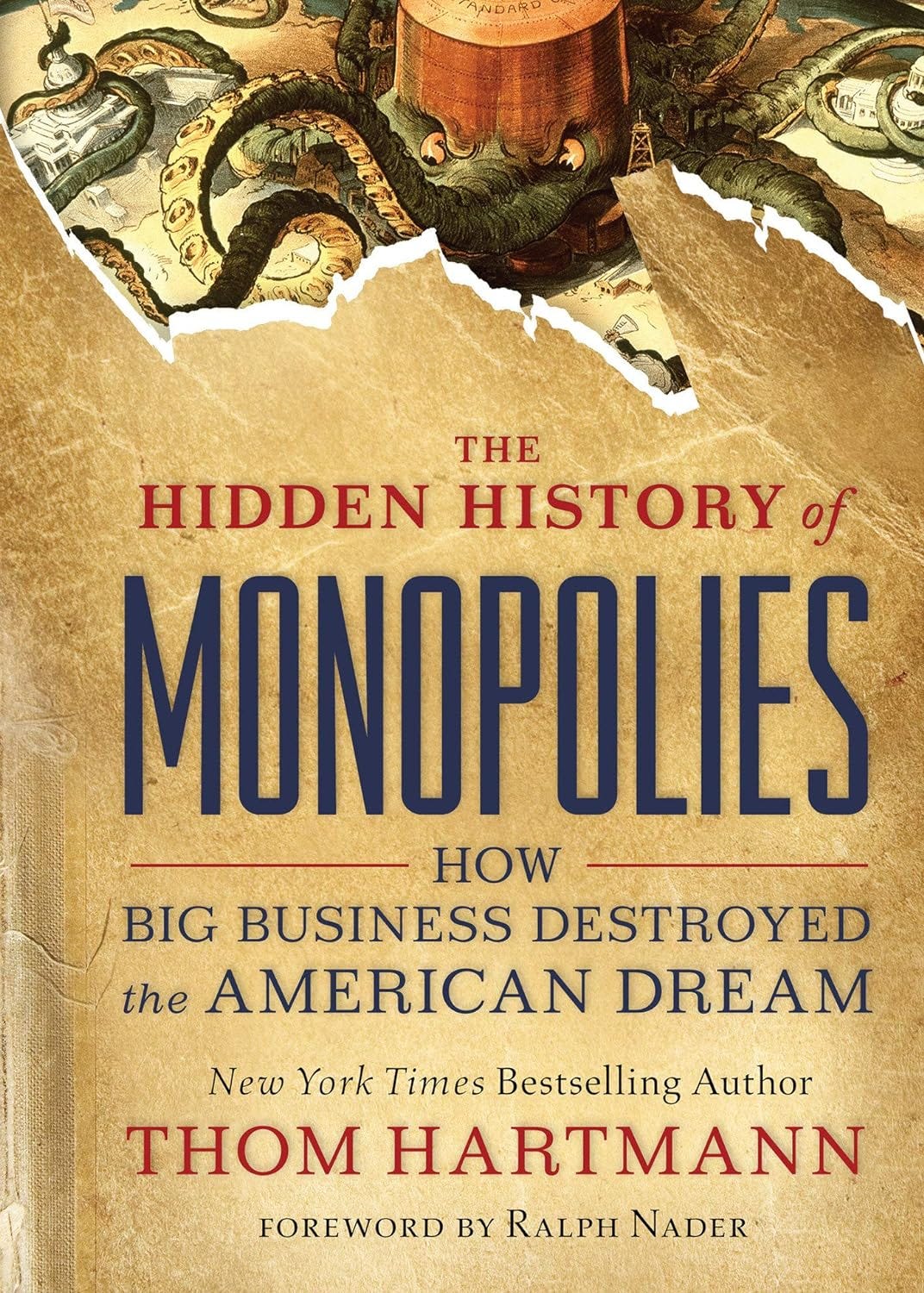Libertarians Object
The Hidden History of Monopolies: How Big Business Destroyed the American Dream

When the commons are sliced and diced by private enterprise, the result is almost always a true “tragedy of the commons” (to quote ecologist Garrett Hardin): exploitation, monopoly, and price gouging.
Whether in a nation’s schools, its utilities, its prisons, its public roads, or even its internet access, when these core parts of the commons are privatized and then ring-fenced by private enterprise, somebody is going to get rich, and the majority of the people will be poorer.Libertarians and their fellow travelers, however, deny that such natural monopolies even exist.
“There is no evidence at all that at the outset of public- utility regulation there existed any such phenomenon as a ‘natural monopoly,’” wrote Thomas J. DiLorenzo for the Review of Austrian Economics.51 He opened the article, in fact, with an even bolder statement by libertarian apologist Murray Rothbard: “The very term ‘public utility’ . . . is an absurd one.”
Libertarianism was invented in 1946 by a think tank organized to advance the interests of very big business, the Foundation for Economic Education. FEE’s project was to provide a pseudoscientific and pseudoeconomic rationale for business’s attacks on government regulation, particularly government “interfering” in “markets” by protecting organized labor’s right to form a union. They invented the libertarian movement out of whole cloth to accomplish this.
FEE was founded in 1946 by Donaldson Brown, a member of the boards of directors of General Motors and DuPont, along with his friend Leonard Read, a senior US Chamber of Commerce executive (and failed businessman).
In 1950, the US House Select Committee on Lobbying Activities, sometimes called the Buchanan Committee after its chairman, Representative Frank Buchanan, D-Pa., found that FEE was funded by the nation’s three largest oil companies, US Steel, the Big Three automakers, the three largest retailers in the country, the nation’s largest chemical companies, and other industrial and banking giants like GE, Eli Lilly, and Merrill Lynch.
As reporter Mark Ames found when researching the Buchanan Committee’s activities, FEE’s board of directors included Robert Welch, who would go on to found the John Birch Society with help from Fred Koch, along with a well-known racist and anti-Semite, J. Reuben Clark, and Herb Cornuelle, who was also on the board of United Fruit (which was then running operations against working and indigenous peo- ple in Hawaii and Central America).52
The Buchanan Committee also discovered that an obscure University of Chicago economist, Milton Friedman, was working as a paid shill for the real estate industry. He was hired through FEE to come up with and publicize “economic” reasons for ending rent price controls, commonly known as rent control. The public good didn’t matter, Friedman concluded; all that mattered was the ability of businessmen to work in a “free market”—free of any substantive obligation to anything other than their own profits.
The Buchanan Committee knew what it had found. It reported the following:
“It is difficult to avoid the conclusion that the Foundation for Economic Education exerts, or at least expects to exert, a considerable influence on national legislative policy. . .
“It is equally difficult to imagine that the nation’s largest corporations would subsidize the entire venture if they did not anticipate that it would pay solid, long-range legislative dividends.”
As Ames notes and the committee uncovered”
“‘Libertarianism’ was a project of the corporate lobby world, launched as a big business ‘ideology’ in 1946 by the US Chamber of Commerce and the National Association of Manufacturers.”53
The man financing much of this, Herbert Nelson, head of the real estate lobby, didn’t think that democracy was even particularly useful, especially if it interfered with the ability of very wealthy people and big corporations to control both markets and the nation. As Nelson wrote, and the committee revealed, “I do not believe in democracy. I think it stinks. I don’t think anybody except direct taxpayers should be allowed to vote.”
In that, Nelson was simply echoing the perspective of many of the conservative movement’s most influential thinkers, from Ayn Rand to Phyllis Schlafly. Ask any objectivist (follower of Ayn Rand) or true libertarian, and they’ll tell you up front: the markets, not voters in a democracy, should determine the fate and future of a nation.
As Stephen Moore, whom Donald Trump tried to nominate to the Federal Reserve, told me on my radio program during the Bush years, he considers capitalism more important than democracy. There’s only one power on earth that can successfully take on monopolists who want to dominate not only a nation’s markets but its politics as well: government. Only We the People can challenge the power of massive, aggregated wealth and the political power it carries.
That’s why libertarians and their libertarian-influenced Republican allies constantly rail against government. As Reagan said in his 1981 inaugural address: “Government is not the solution to our problem; government is the problem.” And if you own a major oil refinery that’s facing huge fines for polluting and causing cancers and don’t want to spend the money to clean it up, that’s true.
Using libertarian theory and theology, big business now has an army of true believers, ready to join the newest billionaire-funded Tea Party to complain about things like health and safety regulations by calling them “government health insurance” and “government interference.”
Meanwhile, it’s now fashionable for tech billionaires to call themselves libertarians. 54


